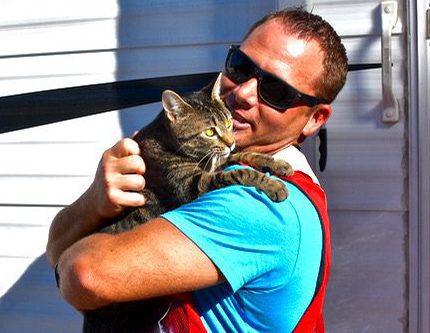
Red Cross volunteer Von Reagan of Charleston is comforting a four-legged residents at a pet-friendly shelter in North Charleston. Photo by Bob Wallace/American Red Cross.
By Andy Brack, editor and publisher | Every one will have a different way of remembering Hurricane Matthew, which got everybody’s attention after it killed hundreds in Haiti on its way north to make a tempestuous landfall in South Carolina.
 From now until eternity, I’m sure that every time I encounter a chocolate-covered almond, I’ll remember eating them while waiting out the storm in Georgia at my parent’s home with my daughters in the Atlanta area. My dad had a Costco-sized container full of them that we all ate until they were gone, And then another container miraculously appeared.
From now until eternity, I’m sure that every time I encounter a chocolate-covered almond, I’ll remember eating them while waiting out the storm in Georgia at my parent’s home with my daughters in the Atlanta area. My dad had a Costco-sized container full of them that we all ate until they were gone, And then another container miraculously appeared.
One daughter says she’ll likely remember visiting her grandparents whenever asked about Hurricane Matthew. Another daughter predicts she’ll recall worrying about the fate of our home in Charleston as the storm blew through.
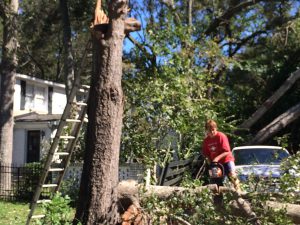
A man clears a fallen tree in West Ashley. Photo by Michael Kaynard.
While Matthew caused significant damage throughout the Southeast coast, we’re fortunate in many ways that it wasn’t worse. You can hear next-day quarterbacking — that the storm “spared” Charleston by making landfall to the north. Or that the tide was worked in Charleston’s favor (generally) by reducing flooding. Or that strong offshore winds worked with the tide to keep floodwaters out of many people’s homes. But the fact of the matter is that the storm that scared us to our cores didn’t pack the overall Carolina punch that we feared.
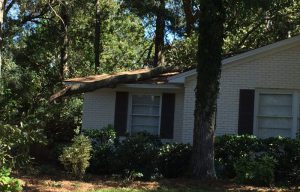
Another fallen tree.
“We were so lucky we are embarrassed to say,” reflected longtime friend Nathalie Dupree, whose Smith Street home weathered the storm fine, but whose banana tree didn’t make it at all.
It also didn’t hurt that everyone was ready — and that forecasting has gotten a lot better since Hurricane Hugo. With a warning of several days, hundreds of thousands heeded the state’s call for coastal evacuations, heading west to Atlanta, Augusta, Columbia, Asheville, Charlotte or all points in between. We either sat transfixed to televisions in hotels, waiting until we could get back, or enjoyed time with family members or friends we hadn’t seen in awhile.
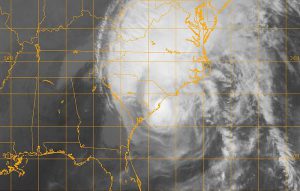
Hurricane Matthew makes landfall near McClellanville, S.C. Image via U.S. Navy.
“There haven’t been this many Charlestonians in Columbia since the convening of the Secession Convention,” joked Charleston-native turned Columbia resident Bud Ferillo. “Glad to see so many old friends.”
Others rode out the storm in grand Charleston style, fueled by creative cocktails or hunkered down in homes darkened by closed shutters, either temporary or permanent.
Mount Pleasant resident Leigh Sabine, who once wrote a column on kids for Charleston Currents, and her husband and twin boys used the storm as a learning experience.
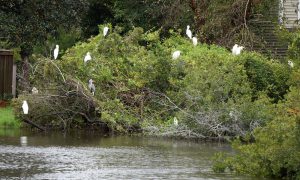
Shore birds hunkered down in trees adjacent to this Mount Pleasant pond. Photo by Leigh Sabine.
“I don’t advocate staying whatsoever, but I do think it’s educational for 13-year-old boys born and raised here to comprehend the realities of their chosen home and what it takes to prepare for a storm and clean up afterwards,” she told us. “A bit scary, but actually worth it. … The camaraderie of the neighborhood was great for the boys to witness too.”
She sent along two photos that we liked — one that highlights how egrets and other marsh birds took refuge in trees along a pond near their home. The other, spied after the storm, was of a lone rose that survived the bluster.
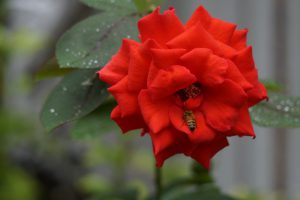
A lone rose that made it through the storm.
As a community, we need to show our thankfulness to all of the police, firefighters, first responders, volunteers, utility workers, elected officials and others who persevered to keep everyone safe throughout and after the storm.
Charleston Animal Society Executive Director Joe Elmore applauded volunteers who showed up Sunday at its North Charleston facility to deal with fallen trees and fencing destroyed in the storm.
“We asked for help to clean up the debris and property so that it would not delay us in arranging other transports to help other shelters on Monday,” he said. “They came with their chainsaws and other equipment and worked to make the Animal Care Campus good as new! I am so proud of our staff, our volunteers, our supporters and our community that loves animals so much.”
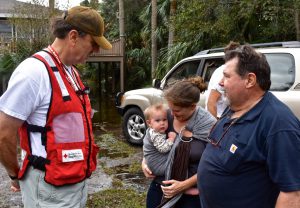
Folly Beach resident Edward Oswald, right, with his daughter Amanda and 8-month old granddaughter Sydney share impressions of the aftermath of Hurricane Matthew with Red Cross volunteer Bailey Williams. They were thankful that there was only minor damage to Edward’s home. Photo Credit: Bob Wallace/American Red Cross.
Other help came from members of the South Carolina National Guard who drove through the hurricane’s rain and gusty winds to deliver a semi-trailer load of shelter supplies to North Charleston when American Red Cross vehicles couldn’t make the trip safely. On Folly Beach and elsewhere throughout Lowcountry communities, Red Cross volunteers from as far away as Grand Rapids, Mich., and other aid workers comforted families thankful that the storm didn’t cause more damage.
If there’s anything good that can come out of a catastrophe like this, it’s that neighbors helped neighbors and Americans who don’t know us pitched into help too. For that service, which will continue in the days ahead, we say, “ Thank you.”



 We Can Do Better, South Carolina!
We Can Do Better, South Carolina!
























